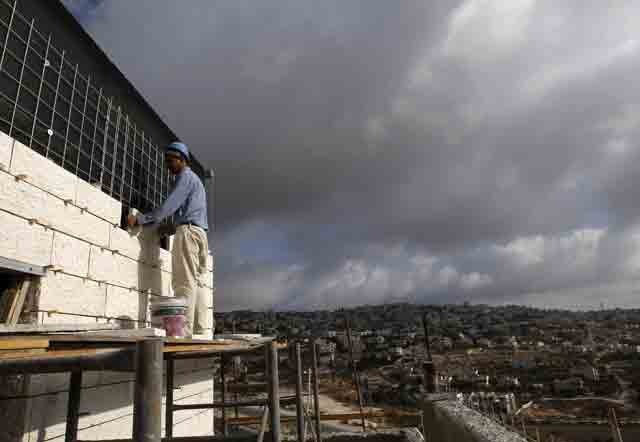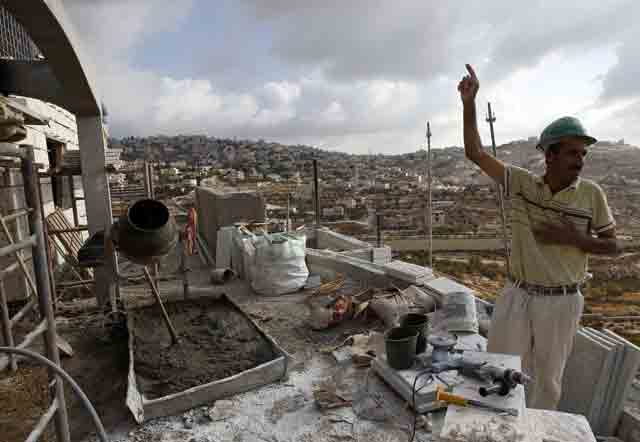
Ramallah: Khalil Al Tafakji, the head of the Maps and Colonies Department in occupied Jerusalem, said that colony construction in the West Bank has not ceased — even during the freeze.
He also said more than 13,000 homes for Israeli colonists in the West Bank would soon be built, in addition to two new colonies to be set up near Nablus and in the Jordan Valley area.
Al Tafakji said the Israelis had never actually ceased construction on the West Bank or in occupied Jerusalem and that the number of home units in these areas had grown dramatically during the so-called moratorium.
"There is not any type of colony freeze implemented in the West Bank and the Israeli government has never adhered to any moratorium," he said.
"The Israeli right wing coalition is based on two main factors including the colony construction in the West Bank and [occupied] East Jerusalem and keeping [occupied] Jerusalem the eternal Israeli capital. This coalition will fall down in a moment should any of these factors even be touched," he added.
Population expansion
If there had been a genuine freeze, how was it possible that the population of the Jewish West Bank colonies had increased, he asked.
"The population of the Jewish West Bank colonies was less than 300,000 people on the day the moratorium was imposed and now the number has risen to 320,000. The Israeli population of [occupied] East Jerusalem was 193,000 the day of moratorium was imposed and today the number exceeds 200,000," Al Tafakji said.
He said there was no mechanism to monitor construction in the colonies. Building had not stopped even though the Israeli government had issued a partial colony freeze — which had never been implemented, he said.
The partial freeze order — which he said Israel had issued verbally — was only in answer to intense international pressure.
Al Tafakji said a real monitoring mechanism would have included photos taken from the air and satellite pictures, but such methods had not been used.
This had given the Israeli government the opportunity to work freely on the ground, and claim falsely that it had implemented a building moratorium in the colonies.
"The situation of the colony work in the West Bank and [occupied] East Jerusalem is going from bad to worse," Al Tafakji said.
He added that when a viable Palestinian state had been addressed, the Israelis assumed that bridges and tunnels would provide the required geographical connection.
However, he said, some Palestinian cities and villages were already connected by tunnels, so there would be no need to halt the colony construction work.
According to a report yesterday released by Peace Now, an anti-colony group in Palestine, a total of 13,000 Jewish homes have been approved for building on the West Bank, as the September 26 deadline for the moratorium on construction in the colony loomed.
Palestinians would only accept a total colony freeze, a senior Fatah official who refused to be named said.
If it did accept less than that, the Palestine Authority would suffer a tremendous lack of credibility in the eyes of the people risking their lives for its survival.
"The attitude of the authority after it had dropped its preconditions for the sake of the resumption of the direct talks is still the main talk of the Palestinian public who accuse Palestinian officials of doing so for no good reason, which has created an ideal environment for Israel to appear as peace seekers, when surely they are not," the Fatah official said. "Nothing will justify it in the public's eyes. It's time to take the public opinion of the Palestinian street into account and not to only look at political and economic pressure on the Palestinian Authority."
The current formula — which gives Israelis the right to build in main colony blocs and avoid construction in the outposts — was worse than resuming construction in all the West Bank Jewish colonies, the official said.
Israeli Prime Minister Benjamin Netanyahu's demand that Israel be recognised as a Jewish state had "never been raised in any previous round of negotiations", the official said.
But Israel was using it as yet another roadblock to peace, he said.
Unfair demands
"The Israeli demand for the Palestinians to recognise Israel as a Jewish state is impossible to meet. The Israelis can not ask the Palestinian leadership to make serious, direct and unprecedented harm to millions of Palestinians living in the historic Palestine and in the diaspora," the Fatah official said.
The official said that the Palestinians' stance had been brought to the attention of the US who expressed an understanding.














